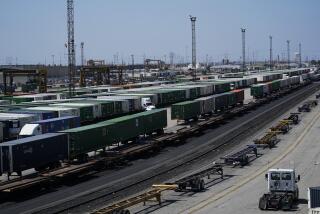EPA Settlement Seeks to Curb Air Pollution From Big Ships
Air pollution from giant commercial ships plying the nation’s coastlines will be targeted for control for the first time under an agreement the U.S. Environmental Protection Agency announced Tuesday.
Under the agreement, which settled a lawsuit filed by environmentalists, the EPA will begin developing rules to cut smog-forming exhaust from the largest, diesel-powered ships, including cargo vessels, tankers and cruise liners. Those ships are a major source of air pollution in many cities along the Pacific, Atlantic and Gulf coasts.
The agency must propose a regulation by April 2002 and take final action on the measure by January 2003, and in the meantime report on its progress.
“Oil tankers and cargo ships are huge contributors to global warming, smog and airborne toxics both in port and at sea,” said Russell Long, director of the Bluewater Network, which filed the suit. “It’s absurd that EPA has lowered the boom on virtually every type of vehicle and factory, but the world’s biggest polluters almost got off scot-free.”
The effectiveness of the agreement could be limited. EPA attorney Mark Kataoka said it requires EPA to prepare, but not necessarily adopt, a regulation for big ships. And he said the measure probably would apply only to new ships flying the U.S. flag. There are only about five such ships launched a year.
“EPA’s rule is just the beginning of a long-term solution to the problem,” Kataoka said. Attorneys for the environmentalists said they will seek to have stringent controls applied to all vessels in U.S. waters.
In Southern California, home to some of the nation’s worst smog, large ships using ports in Long Beach and San Pedro or passing by the coast emit 34 tons of smog-forming nitrogen dioxide gas daily--more than twice as much as all the commercial aircraft operating in the Los Angeles region, according to air quality officials.
And as global commerce surges, more and larger ships are adding pollution every day. Last year, about 3,060 vessels arrived at the Port of Los Angeles, the busiest in the nation, carrying 5 million tons of cargo--27% more than in the previous year, said port spokesman Jeff Leong.
California smog fighters have long urged the EPA to cut ship smog, but the federal government says it has been constrained by maritime treaties. The International Convention for the Prevention of Pollution From Ships calls for reductions in ship emissions, but it has not been ratified by the U.S. Senate or by enough nations to be put into effect.
More to Read
Sign up for Essential California
The most important California stories and recommendations in your inbox every morning.
You may occasionally receive promotional content from the Los Angeles Times.










